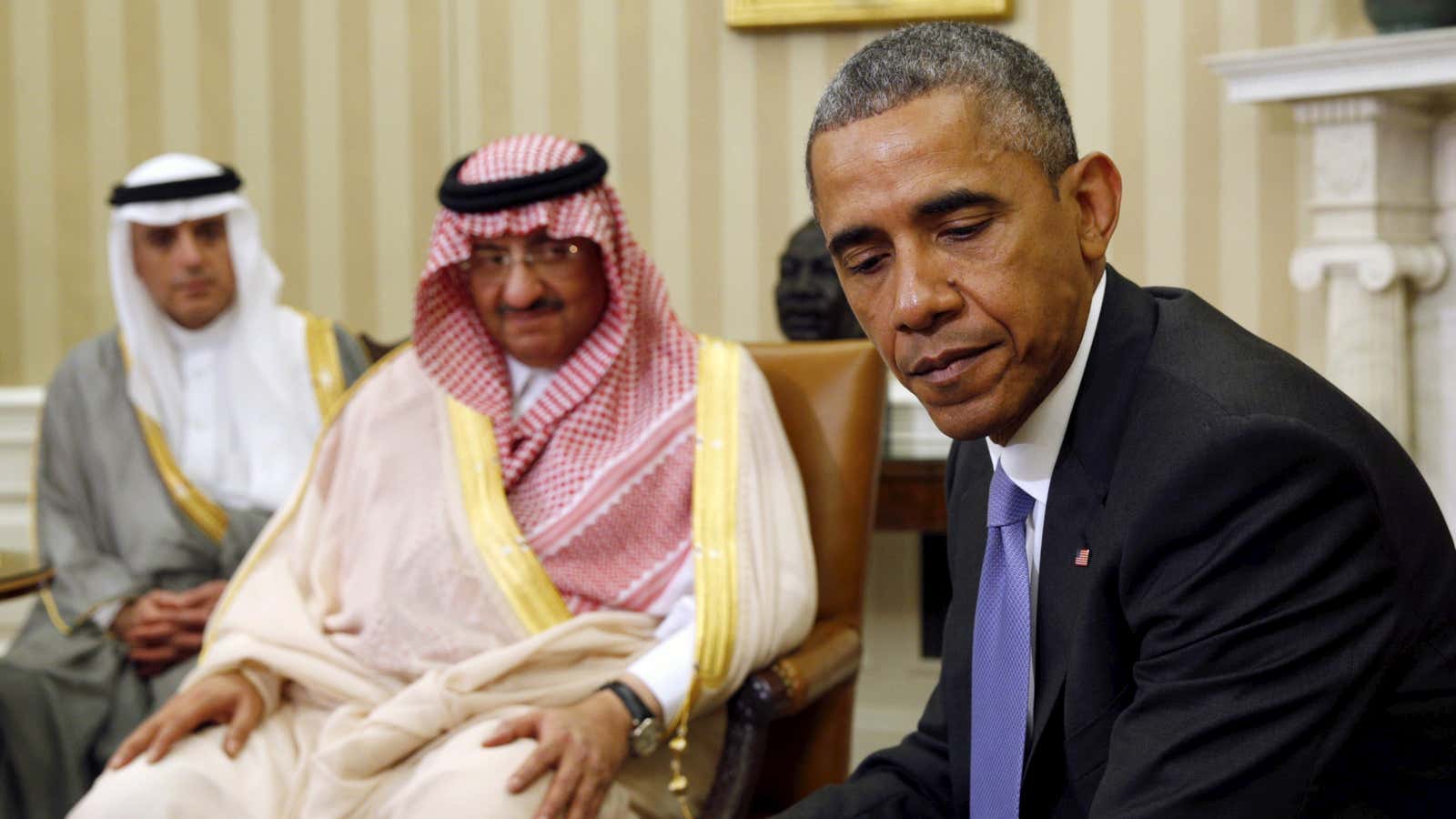As President Obama hosts leaders from Saudi Arabia, Qatar, Oman, Bahrain, Kuwait, and the UAE on May 13 and 14, he will surely hear a push from them for a White House plan to contain Iran. However, recent candid remarks from Admiral Mike Mullen should cause America to think twice. Going against conventional wisdom in Washington, the former Chairman of the Joint Chiefs of Staff said: “[A nuclear deal] would also more fairly rebalance American influence. We need to re-examine all of the relationships we enjoy in the region, relationships primarily with Sunni-dominated nations. Détente with Iran might better balance our efforts across the sectarian divide.”
Let that sink in. The highest-ranking officer in the United States Armed Forces from 2007 to 2011 is essentially saying that America’s long-standing allies in the Middle East are trying to lock it into permanent confrontation with Iran–and into a permanent alliance with countries whose interests and values are increasingly opposed to its own. After the initial shock from Admiral Mullen’s intellectual honesty subsides, one quickly realizes that he is right: Why shouldn’t the U.S. have more options at its disposal to achieve its interests and reduce the threats it faces? For example, after 15 Saudi hijackers attacked the U.S. on September 11th, 2001, American decision-makers did not have the option of being firm with Saudi Arabia. Instead, they were trapped in an alliance precisely because there was no regional alternative that could be leveraged to hold the Saudis accountable.
Obama is often accused of waffling in his projection of American power–most recently by George W. Bush–but it appears that he simply agrees with his former top military commander: American interests in the Middle East are best served by abandoning the failed policies of Dual Containment and the Bush Doctrine that unnecessarily sapped American blood and treasure. Rather than deploying the military to dominate the region, the U.S. instead seeks to forge pragmatic, functioning relations throughout the region to maximize its flexibility.
That is what balancing is all about. But what exactly does it entail? For the US, balancing is based on two key functions. First, it means that America’s strategic goal is not promoting Israeli or Saudi domination of the Middle East, but rather ensuring that no regional power cements political, economic or military domination. This helps safeguard against hostile countries adversely affecting energy production and exports–and by extension, the global economy.
Second, and perhaps more importantly, balancing also ensures that America can work with all countries to reduce security threats as they evolve. For example, when U.S. and Iranian tactical or strategic interests converge in the fight against ISIS, they can work together in Iraq against Saudi, Qatari, Turkish and other malign influence. When Washington and Tehran see their interests diverge in Yemen, the U.S. can team up with Saudi Arabia and other Persian Gulf countries to work against Iranian interests.
The foremost benefit of working with a greater number of countries can be summed up in two words: leverage and options. An ill-conceived war in Iraq, an oil-for-security pact with Saudi Arabia, and an inability to hold Israel accountable for its occupation of Palestinian territory have severely reduced American influence and flexibility in the Middle East. Rebalancing will not change the status quo on these issues, but it will impose a cost on countries that take U.S. support for granted. Riyadh and Tel Aviv will have to think twice before implementing policies that damage American security interests if they know Washington can pick up the phone and call Tehran instead. The more options America has, the greater its leverage becomes.
For its part, Tehran already knows that the Saudis and Israelis are more than willing to help America contain and challenge Iran. But Iranian decision-makers have signaled their willingness to accept an American rebalancing–so long as the U.S. accepts Iran’s prominent role in the region and respects Iran’s interests and security concerns. As one senior Iranian official explained to me, Tehran is open to working in coalitions – both tactically and strategically, as well as regionally and globally – because it believes it can achieve its strategic objectives by balancing cooperation and competition, particularly vis-à-vis the United States.
More specifically, Iran is using the nuclear negotiations as a litmus test to see if it can manage–and gradually improve–its relations with the U.S. by containing existing tensions and preventing new conflicts from emerging. Earlier this month, Ayatollah Khamenei confirmed this approach when he said: “If the other side gives up its usual diversionary tactics, this will become an experience for us that, very well, we can negotiate with them on other issues.” Iran is willing to test this proposition precisely because it has remained independent from foreign powers, thereby providing it with greater flexibility than its regional neighbors.
To be clear, rebalancing after a nuclear deal is preferable to the regional status quo, but it is not a silver bullet. Washington and Tehran will likely not become allies, but the bilateral relationship can shift from enemies to competitors–relations in which they continue to challenge one another’s power, but with diplomats rather than bombs or bullets. That is why regional integration through dialogue and engagement–even if it’s a love-hate relationship–provides the best hope for shifting Iranian policy in such a way that accepts U.S. global leadership, maximizes Washington’s flexibility, and reduces the threats to American interests in the Middle East.




